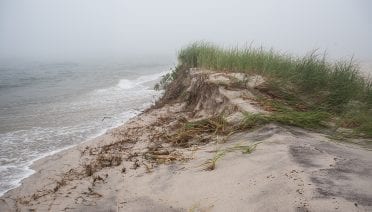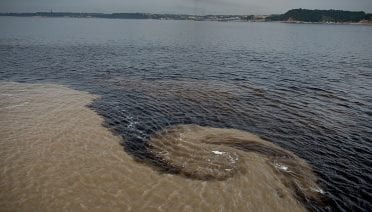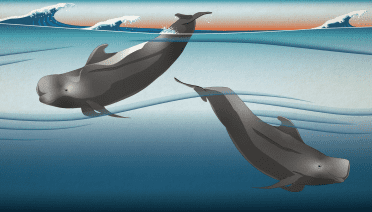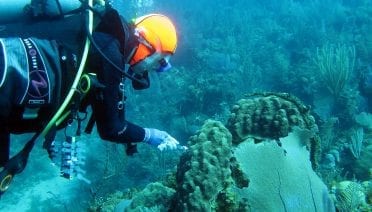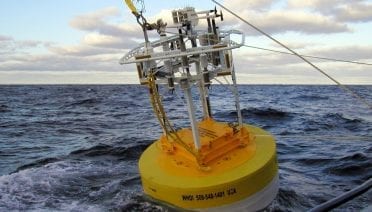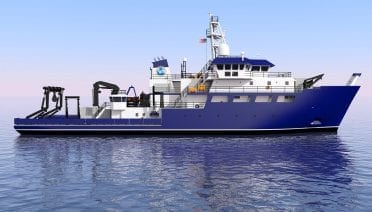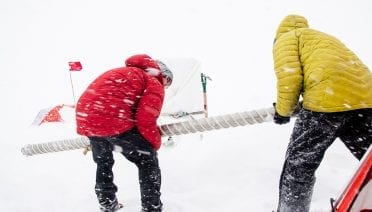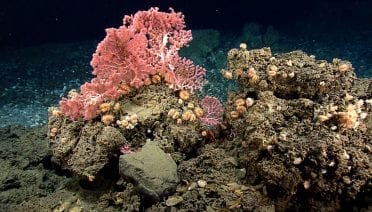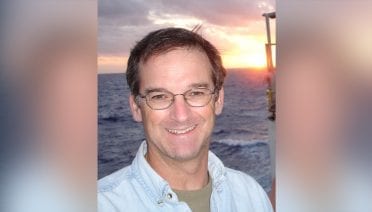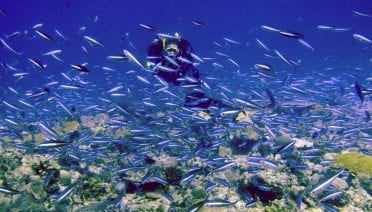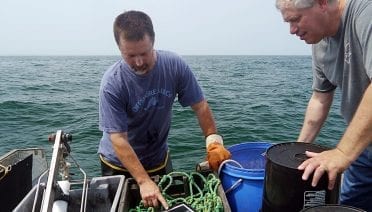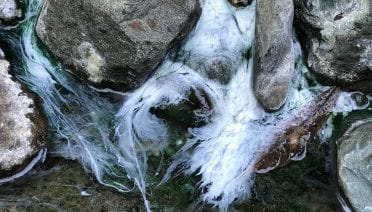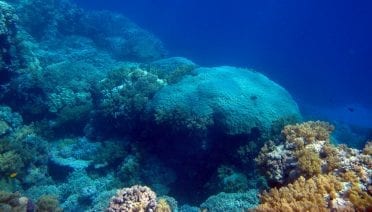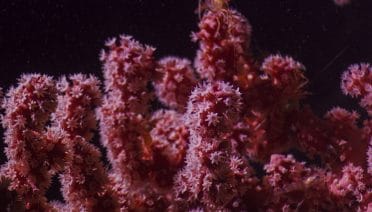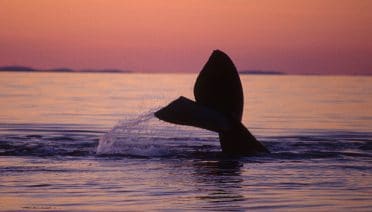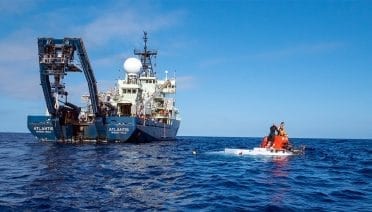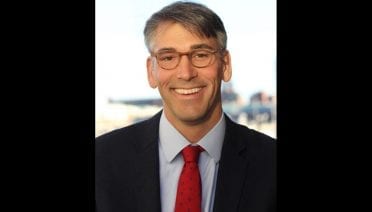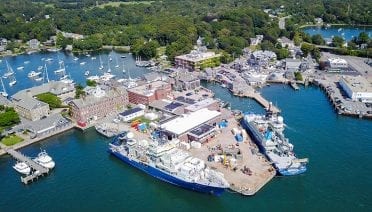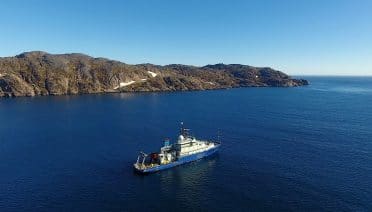Press Room
A new study by the Woods Hole Oceanographic Institution (WHOI) clarifies what influence major currents in the North Atlantic have on sea level along the northeastern United States. The study, published June 13 in the journal Geophysical Research Letters, examined both the strength of the Atlantic Meridional Overturning Circulation (AMOC)—a conveyor belt of currents that move warmer waters north and cooler waters south in the Atlantic—and historical records of sea level in coastal New England.
A new study from researchers at the Woods Hole Oceanographic Institution (WHOI) and Harvard University may help settle a long-standing question—how small amounts of organic carbon become locked away in rock and sediments, preventing it from decomposing. Knowing exactly how…
Findings could represent new drug targets for human pathogens A new study led by researchers at Woods Hole Oceanographic Institution (WHOI) and Swansea University Medical School furthers our knowledge of viruses—in the sea and on land— and their potential to…
Short-finned pilot whales have long been recognized as a single species, but a recent study found that two unique subspecies actually exist.
WHOI scientists distinct discover microbes living just a few centimeters from the surface of corals near the southern coast of Cuba. The discovery may yield clues about the ecological functions of microbes, and how they find and infect coral colonies.
The National Oceanic and Atmospheric Administration (NOAA) selected Woods Hole Oceanographic Institution (WHOI) to host NOAA’s Cooperative Institute for the North Atlantic Region (CINAR). Cooperative Institutes are NOAA-supported, non-federal organizations that have established outstanding research and education programs in one…
Officials from the Woods Hole Oceanographic Institution (WHOI) took part in a keel-laying ceremony this week to mark the start of construction of R/V Resolution, a new $125 million Regional Class Research Vessel (RCRV) funded by the National Science Foundation (NSF).
Scientists at MIT, Woods Hole Oceanographic Institution (WHOI), and elsewhere have found evidence that phytoplankton’s productivity is declining steadily in the North Atlantic, one of the world’s most productive marine basins.
WHOI will join a new consortium led by the University of Rhode Island Graduate School of Oceanography to support ocean exploration.
The Woods Hole Oceanographic Institution (WHOI) announces that Dr. Richard W. Murray has accepted the position of the Deputy Director & Vice President for Research of the institution. He will assume the office on Sept. 1, 2019. A geochemist whose research…
The Deerbrook Charitable Trust has awarded $5 million to Woods Hole Oceanographic Institution (WHOI) to establish the Deerbrook Ocean Science Acceleration Fund (DOSA Fund). This gift launches the new WHOI Research Accelerator, a lasting endowment to drive ocean research, innovation,…
A review paper recently published in the journal Annual Review of Marine Science highlights the value of collaboration between researchers and fishing fleets in monitoring ocean conditions in New England and beyond. “There is a dire need for more data…
Two years ago an international team of scientists visited Costa Rica’s subduction zone, where the ocean floor sinks beneath the continent and volcanoes tower above the surface. They wanted to find out if microbes can affect the cycle of carbon…
Using chemical data from corals in the Red Sea, WHOI scientists reconstructed nearly three centuries of wind data that provided a definitive, natural record of the monsoon’s intensity. The finding, published online March 28 in the journal Geophysical Research Letters, show that monsoon winds have indeed increased over the past centuries.
New ‘bubblegum’ corals found in Northeast Canyons and Seamounts National Monument during human-occupied submersible dives.
The North Atlantic right whale is a critically endangered whale species that is protected under the U.S. Endangered Species Act, the Marine Mammal Protection Act, and Canadaâs Species at Risk Act. These animals, of which there are only 411 remaining, are often found within 50 miles of the East Coast of North America, making them vulnerable to human activities.
Scientists, engineers, vehicle operators, and ship crew from the Woods Hole Oceanographic Institution (WHOI) will be a featured part of the upcoming BBC program, Blue Planet Live, which will air over four nights beginning March 24. The series will include two live broadcasts from the research vessel Atlantis showing launch and recovery of the human-occupied submersible Alvin.
Woods Hole Oceanographic Institution (WHOI) has selected Court Clayton, an expert in fundraising and philanthropic giving, as the Institutionâs new Chief Development Officer (CDO). Clayton brings two decades of frontline fundraising and management experience to WHOI within higher education and global non-governmental organizations.
Members of the Massachusetts Seaport Economic Council (SEC) gave the green-light to a $1 million grant proposal from the Town of Falmouth and Woods Hole Oceanographic Institution (WHOI). The SEC, chaired by Lieutenant Governor Karyn Polito, promotes economic growth in the maritime sector through competitive grants to municipalities and their partners.
In the Atlantic MOC, warm, salty, shallow waters are carried northward from the tropics by currents and wind, and then converted into colder, fresher, deep waters that return southward through the Iceland and Irminger basins. In a departure from the prevailing scientific view, the study shows that most of the conversion from warm to cold water – or ‘overturning’ and its month-to-month variability – is occurring in regions between Greenland and Scotland, rather than in the Labrador Sea off Canada, as many past modeling studies have suggested.

